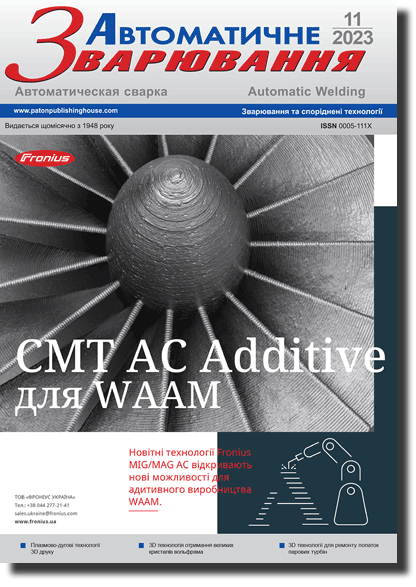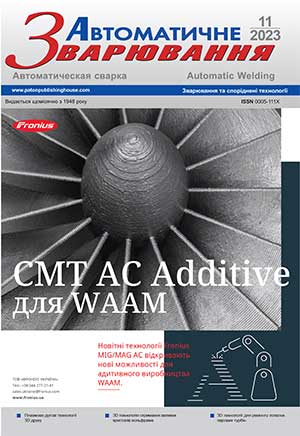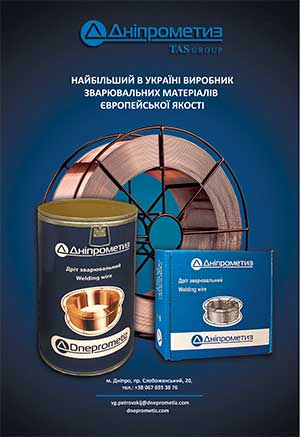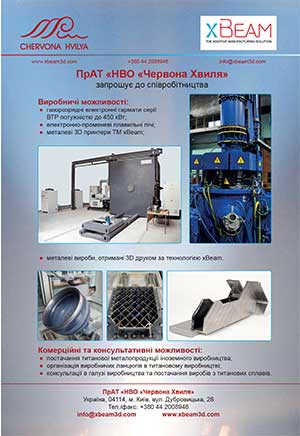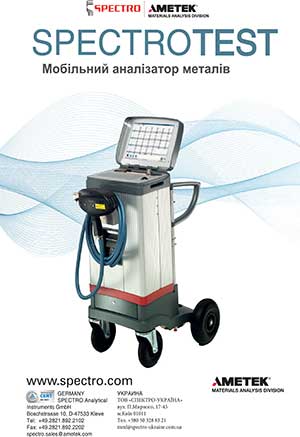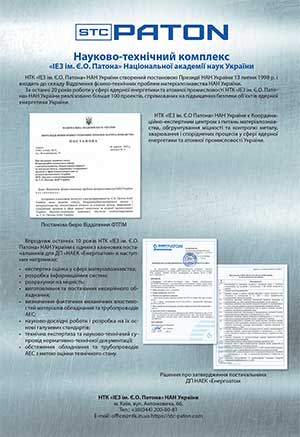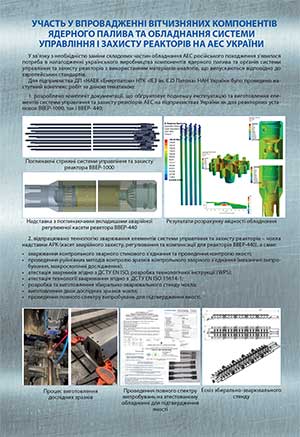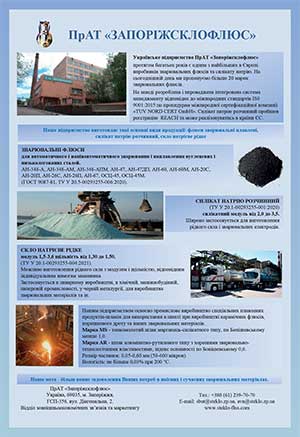| 2023 №11 (06) |
DOI of Article 10.37434/as2023.11.07 |
2023 №11 (08) |
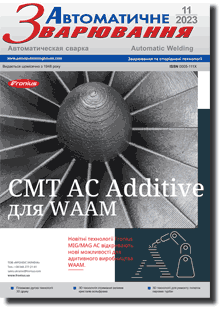
"Avtomatychne Zvaryuvannya" (Automatic Welding), #11, 2023, pp. 64-70
Titanium-based metal powder wires as materials for additive manufacturing
S.L. Schwab1, R.V. Selin1, S.V. Akhonin1, M.M. Voron2, D.V. Kovalchuk3
1E.O. Paton Electric Welding Institute of the NAS of Ukraine. 11 Kazymyr Malevych Str., 03150, Kyiv, Ukraine. E-mail: office@paton.kiev.ua22Physico-TechnologicaI Institute of Metals and Alloys of the NAS of Ukraine. 34/1 Vemadskyi Blvd., 03142, Kyiv, Ukraine.
3PJSC «NVO «Chervona Khvylya», 28 Dubrovytska Str., 04114, Kyiv, Ukraine. E-mail: dmytro@xbeam3d.com
The paper shows the possibility of manufacturing metal flux-cored wires based on high-strength titanium alloys of different compositions (Ti–5Al–5Mo–5V–1Fe–1Cr and Ti–5Al–5Mo–5V–4Nb–1.5Cr–1Fe–2.5Zr systems), alloy based on medical grade titanium (Ti–13Zr–13Nb system) and structural titanium VT6 alloy (Ti–6Al–4V system), reinforced with TiC particles. The technological moments of the experimental production of metal flux-cored wires by the method of drawing and subsequent pulling are shown. The study was conducted on using these materials as a filler metal in WAAM technology both in the methods of argon arc as well as electron beam surfacing. Ref. 21, Tab. 1, Fig. 10.
Keywords: high-strength titanium alloys, metal flux-cored wire, WAAM, TIG, xBeam 3D Metal Printing
Received: 20.10.2023
References
1. Martina, F., Colegrove, P.A., Williams, S.W., Meyer, J. (2015) Microstructure of interpass rolled wire + arc additive manufacturing Ti-6Al-4V components. Metall. Mater. Trans. A, 46(12), 6103-6118. https://doi.org/10.1007/s11661-015-3172-12. Ríos, S., Colegrove, P.A., Martina, F., Williams, S.W. (2018) Analytical process model for wire + arc additive manufacturing. Addit. Manuf., 21, 651-657. https://doi.org/10.1016/j.addma.2018.04.003
3. Bekker, A.C.M., Verlinden, J.C. (2018) Life cycle assessment of wire + arc additive manufacturing compared to green sand casting and CNC milling in stainless steel. J. Clean. Prod., 177, 438-447. https://doi.org/10.1016/j.jclepro.2017.12.148
4. Lütjering, G., Williams, J.C. (2007) Titanium. 2nd ed.; Springer, Berlin/Heidelberg, Germany.
5. Akhonin, S.V., Schwab, S.L. (2019) Filler flux-cored wire for tig welding and surfacing of VT22 titanium alloy. The Paton Welding J., 6, 34-37. https://doi.org/10.15407/tpwj2019.06.06
6. Yanko, T.B., Ovchinnikov, A.V., Lyutyk, N.P., Korzhyk, V.N. (2018) Technology for obtaining of plasma spheroidised HDH titanium alloy powders used in 3D printing. Technological systems, 85(4), 36-41. DOI: http://dx.doi.org/10.29010/085.7
7. Sun, P., Fang, Z.Z., Zhang, Y., Xia, Y. (2017) Review of the methods for production of spherical Ti and Ti alloy powder. Jom, 69(10), 1853-1860. https://doi.org/10.1007/s11837-017-2513-5
8. Koshelev, V.Ya., Kuznetsov, V.A., Sukhov, D.I. (2010) To problem of manufacturing of granules of less than 200 μm coarseness from titanium alloys by plasma melting method and centrifugal spraying of cast billet. Tekhnologiya Lyogkikh Splavov, 2, 44-48 [in Russian].
9. Schwab, S., Selin, R., Voron, M. (2023) Welding materials for TIG welding, surfacing, and WAAM technology of titanium alloys. Welding in the World, 67(4), 981-986. https://doi.org/10.1007/s40194-023-01464-z
10. Schwab, S., Selin, R., Voron, M. (2023) Welding materials for TIG welding, surfacing, and WAAM technology of titanium alloys. Avtomatychne Zvaryuvannya, 3, 10-14. https://doi.org/10.1007/s40194-023-01464-z
11. Akhonin, S.V., Selin, R.V., Brrezos, V.A. et al. (2016) Development of new high-strength titanium alloy. Sovrem. Elektrometall., 4, 22-27. https://doi.org/10.15407/sem2016.04.04
12. Prilutsky, V.P., Akhonin, S.V., Schwab, S.L., Petrychenko, I.K. (2018) Effect of heat treatment on the structure and properties of titanium alloy VT22 welded joints produced by TIG-welding with flux-cored wire. Materials Science Forum, 927, 119-125. https://doi.org/10.4028/www.scientific.net/MSF.927.119
13. Shunxing, L. (2020) Review of the design of titanium alloys with low elastic modulus as implant materials. Advanced Engineering Materials, 22(11). https://doi.org/10.1002/adem.202000555
14. Niinomi, M. (2011) Low modulus titanium alloys for inhibiting bone atrophy. In: Biomaterials Science and Engineering (Book). Edited by Prof. R. Pignatello, pp. 249-268. https://doi.org/10.5772/24549
15. ВVoron, M., Shvab, S., Selin, R. (2022) Modern approaches in development of biocompatible titanium alloys with higher level of service properties. Metal ta Lyttya Ukrainy, 30(2), 88-95. https://doi.org/10.15407/scin15.04.005
16. Xiatong, B. et al. (2022) Exploring the limits of mechanical properties of Ti-Zr binary alloys. Materials Letters, 318, 132091. https://doi.org/10.1016/j.matlet.2022.132091
17. Miracle, D. (2005) Metal matrix composites - From science to technological significance. Composites Science and Technology, 65(15-16), 2526-2540. https://doi.org/10.1016/j.compscitech.2005.05.027
18. Ivasishin, O.M., Markovsky, P.E., Savvakin, D.G. et al. (2019) Multi-Layered structures of Ti-6Al-4V alloy and TiC and TiB composites on its base fabricated using blended elemental powder metallurgy. J. Mater. Proc. Technol., 269, 172- 181. https://doi.org/10.1016/j.jmatprotec.2019.02.006
19. Kovalchuk, D., Melnyk, V., Melnyk, I., Tugai, B. (2016) Prospects of application of gas-discharge electron beam guns in additive manufacturing. J. of Elektrotechnica & Elektronica (E+E), 51(5-6), 37-43.
20. Kovalchuk, D., Melnyk, V., Melnyk, I. et al. (2021) Microstructure and properties of Ti-6Al-4V articles 3D-printed with co-axial electron beam & wire technology. J. of Materials Engineering and Performance, 30(7), 5307-5322. https://doi.org/10.1007/s11665-021-05770-9
21. Kovalchuk, D., Melnyk, V., Melnyk, I. (2022) A coaxial wire-feed additive manufacturing of metal components using a profile electron beam in space application. J. of Materials Engineering and Performance, 31(8), 6069-6082. https://doi.org/10.1007/s11665-022-06994-z
Advertising in this issue:
The cost of subscription/purchase order journals or individual articles
| Journal/Currency | Annual Set | 1 issue printed |
1 issue |
one article |
| TPWJ/USD | 384 $ | 32 $ | 26 $ | 13 $ |
| TPWJ/EUR | 348 € | 29 € | 24 € | 12 € |
| TPWJ/UAH | 7200 UAH | 600 UAH | 600 UAH | 280 UAH |
| AS/UAH | 1800 UAH | 300 UAH | 300 UAH | 150 UAH |
| AS/USD | 192 $ | 32 $ | 26 $ | 13 $ |
| AS/EUR | 180 € | 30 € | 25 € | 12 € |
| SEM/UAH | 1200 UAH | 300 UAH | 300 UAH | 150 UAH |
| SEM/USD | 128 $ | 32 $ | 26 $ | 13 $ |
| SEM/EUR | 120 € | 30 € | 25 € | 12 € |
| TDNK/UAH | 1200 UAH | 300 UAH | 300 UAH | 150 UAH |
| TDNK/USD | 128 $ | 32 $ | 26 $ | 13 $ |
| TDNK/EUR | 120 € | 30 € | 25 € | 15 € |
AS = «Automatic Welding» - 6 issues per year;
TPWJ = «PATON WELDING JOURNAL» - 12 issues per year;
SEM = «Electrometallurgy Today» - 4 issues per year;
TDNK = «Technical Diagnostics and Non-Destructive Testing» - 4 issues per year.




